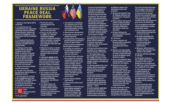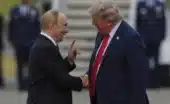Johannah Bernstein post: "eternally proud of my father’s extraordinary aeronautical engineering. legacy. here is a photo of the Canadair Water…
D-Day 2024
Written by Diana Thebaud Nicholson // June 6, 2024 // Britain/U.K., Canada, U.S. // Comments Off on D-Day 2024
Brexit Bites Back
Recreating a jump into Normandy D-Day zone 80 years later, British paratroopers face French customs
Videos of paratroopers’ border checks on a Normandy field quickly went viral on social media with users’ comments falling on the 8-year-old Brexit divide – some still bitter over Britain’s exit from the EU and others mocking the French zest for rules as two staunch allies commemorate the start of the battle that has led to liberation of Europe from Nazis.
Courage and Calvados: The Canadian Correspondents Who Covered D-Day
David Halton’s father, the late CBC foreign correspondent Matthew Halton, often described as Canada’s Ed Murrow, was one of seven Canadian reporters embedded with our D-Day landing forces. David’s riveting biography of his father, Dispatches from the Front: The Life of Matthew Halton, Canada’s Voice at War, was published in 2014.
By David Halton
(Policy) For Canadian war correspondents, D-Day was a time of both tribulation and triumph. It was an exceptionally high-stakes, high-stress assignment. Yet it was Ross Munro, a Canadian Press reporter, who was the first correspondent from any country to have an account of the invasion published from the Normandy beachhead. Other scoops would follow, when the first film and photos of the invasion to be seen in the U.K. and North America were shot by Canadians.
It was also a time of bitter frustration for radio correspondents — including my father, the CBC’s Matthew Halton — who were unable to record the event for another 48 hours. …
D-Day at 80
Veterans of the pivotal battle of World War II are disappearing. Europe, facing new conflict, recalls what their comrades died for.
By Roger Cohen; Photographs by Laetitia Vancon
Roger Cohen reported from Normandy, and Laetitia Vancon from Normandy and the United States.
(NYT) They were ordinary. The young men from afar who clambered ashore on June 6, 1944, into a hail of Nazi gunfire from the Normandy bluffs did not think of themselves as heroes.
No, said Gen. Darryl A. Williams, the commanding general of United States Army Europe and Africa, the Allied soldiers “in this great battle were ordinary,” youths who “rose to this challenge with courage and a tremendous will to win, for freedom.”
In front of the general, during a ceremony this week at Deauville on the Normandy coast, were 48 American survivors of that day, the youngest of them 98, most of them 100 years old or more. The veterans sat in wheelchairs. They saluted, briskly enough. Eight decades have gone by, many of them passed in silence because memories of the war were too terrible to relate.
When the 90th anniversary of D-Day comes around in 2034, there may be no more vets. Living memory of the beaches of their sacrifice will be no more.
Ishaan Tharoor The West’s liberal establishment clings to D-Day’s legacy
American and European leaders are using the occasion to voice new warnings for the future.
(WaPo) No single battle looms larger in the Western imagination, 80 years on, than this. Generations of politicians have lauded the bravery of the soldiers who carried out the perilous amphibious landing, eventually overwhelming the Nazi defenses before embarking on the eastward push to Germany. The sacrifice made by the thousands of soldiers who died on the beaches — and the tens of thousands who fell as Allied forces fought their way through Normandy — is cast almost as a founding moment of the international order, the harrowing killing fields that secured an age of freedom and democracy.
… Eight decades after D-Day, Western leaders used the occasion to voice new warnings for the future. “In their generation, in their hour of trial, the Allied forces of D-Day did their duty,” Biden said, standing before dozens of World War II veterans at the Normandy American Cemetery. “Now the question for us is, in our hour of trial, will we do ours?” …
Without naming Trump, Biden seemed to call out his challenger’s skepticism of NATO and conspicuous affection for Russian President Vladimir Putin, who was not invited to the ceremonies as the Kremlin continues its invasion of Ukraine. “To surrender to bullies, to bow down to dictators is simply unthinkable,” Biden said. “If we were to do that, it means we’d be forgetting what happened here on these hallowed beaches.”
Macron used the occasion to hail the leadership and heroism of Ukrainian President Volodymyr Zelensky, who traveled from a series of meetings in Asia to Normandy. “With the return of war on European soil … and in the face of those who want to change borders, let us be worthy of those who landed here,” Macron said at an event at Omaha Beach, with a dozen heads of state and government in attendance, including Zelensky.
Canadian Prime Minister Justin Trudeau also chimed in, gesturing both to Putin’s neo-imperialism and the illiberal factions in the ascendant across the West’s democracies. “Our way of life didn’t happen by accident, and it won’t continue without effort,” he said. “Democracy is still under threat today. It is threatened by aggressors who want to redraw borders. It is threatened by demagoguery, misinformation, disinformation, foreign interference.”
As the survivors fade into history, the world marks a D-Day anniversary like no other
The number of veterans who remember the operation that turned the tide grows smaller each year
(CBC) On so many different levels, the gathering of western leaders in Normandy today is steeped in symbolism as the nations whose troops stormed the beaches eight decades ago reflect on wars past and present.
The ceremonies unfolding throughout today, however, also mark what might be the world’s last opportunity to celebrate the handful of surviving soldiers, sailors and aircrew who charged forth on June 6, 1944 into the teeth of the Nazi guns — and to say goodbye.
Thirteen Canadian veterans of the Second World War were in attendance for Thursday’s anniversary ceremonies at Juno Beach.
Veterans Affairs Minister Ginette Petitpas-Taylor said this year’s commemoration will likely be the last attended by veterans of the European campaign, but the federal government will continue to mark the occasion.
‘Canadians came together as one’: PM
Prime Minister Justin Trudeau paid tribute to the sacrifices made by Allied forces, including 14,000 Canadians who landed at Juno Beach, after a performance by guitarist Mitchell Makoons and fiddler Morgan Grace, both Métis from Manitoba.
“On the battlefield, francophones, anglophones, Indigenous people and new Canadians came together as one. Brave Canadians like you sacrificed everything for our freedom,” said Trudeau. “There are no words to describe the immensity of the debt we owe you.”
Policy D-Day 80th Anniversary series.
Ironically, with the world once again engaged in a war of values between democracy and tyranny, the meaning and lessons of D-Day are arguably more relevant this year, eight decades later, than in any previous commemoration.
Lessons from D-Day for a World Order in Peril
By Colin Robertson
While we now take the victory for granted, it was an extraordinary feat of planning and execution. As [Canadian historian Terry Copp] explains:
“The seemingly impossible victory was the product of Allied success and German failure at the strategic, operational, and tactical levels. There is not much controversy about strategy. The German generals as well as Hitler persuaded themselves, with some help from Allied deception schemes, that the main Allied attack would take place in the Pas de Calais and they held to the view until late July-early August, forcing a limited number of German infantry divisions to fight an attritional battle with diminishing resources…At the operational level, the Allies devised an approach to battle that minimized their weaknesses and maximized their strengths…At the tactical level, the German doctrinal commitment to the immediate counterattack by whatever forces were available allowed the Allies to plan brigade- and battalion-level actions in the sure and certain knowledge that the enemy would come at them as soon as possible.”
If the United States was the ‘arsenal of democracy’ then Canada, said Franklin Roosevelt, was its ‘aerodrome’, training more than 130,000 Commonwealth and allied aviatorsat bases across the nation.
Our merchant mariners and the Royal Canadian Navy were instrumental in winning the longest battle of the war, that in the North Atlantic, shepherding convoys of food, fuel, men and armaments to beleaguered Britain. It was the situation that most troubled Winston Churchill. By war’s end, Canada possessed the third largest navy, a tribute to our shipbuilders and recruitment capacity, and a reputation for having acquitted ourselves admirably in battle.
Our hard-power prowess earned us a voice and a seat at the tables designing the post-war order. Our diplomats understood the relationship between hard and soft power and leveraged both accordingly. Having lived through two world wars, experiencing the collapse of order, they did so conscious that war is the decider in international politics.
Their vision of Canada was that of a middle power – a bridge and helpful fixer – but it was premised on a strong military capacity. In practise, this meant a strong contribution to NATO and a strong contribution to NORAD. They recognized that the world is a brutal and violent place.
They became the diplomatic engineers to the American architects, in creating the multilateral institutions: the United Nations in San Francisco and the IMF and World Bank at Bretton Woods and then the alphabet soup of functional agencies that continue to serve humanity. They practised diplomacy but they knew that the deterrent force created through the NATO alliance was essential.
Remembering and learning about the past matters. It gives us context for what is happening today and a sense of how to prepare for tomorrow. History does not repeat itself but there are rhythms to human behaviour.
The astonishing achievement of D-Day
Robert Tombs
Would any of the world’s armed forces or alliances be capable of what was achieved in 1944?
(The Spectator UK) … The scale of the 1944 invasion is unique in history
The scale and complexity of the invasion are even now astonishing, and it ought to deter any country – China, let us say – contemplating a major seaborne attack. Would any of the world’s armed forces today, or any alliance, be capable of the level of planning achieved in 1944? I doubt it. Could any country or coalition marshal the resources deployed on D-Day? It required the accumulated strength of two major industrial and military powers, Britain and America, built up over many months, and assembled from across the globe. The two great passenger liners, Queen Mary and Queen Elizabeth, had ferried thousands of American troops across the Atlantic faster than any U-Boat could catch.
The planning was the fruit of years of wartime experience. Fittingly, the principal naval planner, Admiral Bert Ramsay, had five years earlier organised the no less astonishing retreat from Dunkirk. He deserves our gratitude, and if he is sometimes forgotten, it is because he died in a plane accident in France only a few months later.
Nothing could be left to chance. The depth of water. The softness of sand. The location of German defences and troops. And the weather. The most important forecast in history was made by a Scottish meteorologist, Dr James Stagg, commissioned into the RAF. At a time of unsettled weather, he predicted an interval of sufficient calm on 6 June for the troops to land. The Germans predicted storms, so many senior officers left their posts, including the commander of the coastal defences, General Erwin Rommel, who went to Berlin for his wife’s birthday. …
On D-Day, the U.S. Conquered the British Empire
On June 6, 1944, the British found themselves suddenly and irrevocably overtaken by their former colony.
By Michel Paradis
(The Atlantic) For most Americans, D-Day remains the most famous battle of World War II. It was not the end of the war against Nazism. At most, it was the beginning of the end. Yet it continues to resonate 80 years later, and not just because it led to Hitler’s defeat. It also signaled the collapse of the European empires and the birth of an American superpower that promised to dedicate its foreign policy to decolonization, democracy, and human rights, rather than its own imperial prestige.
It is easy to forget what a radical break this was. The term superpower was coined in 1944 to describe the anticipated world order that would emerge after the war. Only the British empire was expected to survive as the standard-bearer of imperialism, alongside two very different superpower peers: the Soviet Union and the United States. Within weeks of D-Day, however, the British found themselves suddenly and irrevocably overruled by their former colony.
When the British and the Americans formally allied in December 1941, the British empire was unquestionably the senior partner in the relationship. … Things changed, however, in November 1943, when Winston Churchill and Franklin D. Roosevelt held a summit in Cairo. The British again sought to postpone the invasion of France in favor of further operations in the Mediterranean. The debate quickly grew acrimonious. …
With the fate of the free world hanging in the balance, a roomful of 60-year-old men nearly broke out into a brawl because by November 1943, America had changed. It was producing more than twice as many planes and seven times as many ships as the whole British empire. British debt, meanwhile, had ballooned to nearly twice the size of its economy. Most of that debt was owed to the United States, which leveraged its position as Britain’s largest creditor to gain access to outposts across the British empire, from which it built an extraordinary global logistics network of its own.
The British continued to wield considerable influence on world affairs, as they do today. But after D-Day, on the battlefields of Europe and in international conference rooms, instead of setting the agenda, the British found themselves having to go along with it.
In July 1944, at the Bretton Woods Conference, the British expectation that global finance would remain headquartered in London and transacted at least partially in pounds was frustrated when the International Monetary Fund and what would become the World Bank were headquartered in Washington and the dollar became the currency of international trade.
1 May 2023
In their footsteps: Canadians honour troops who liberated the Netherlands
More than 1.1 million Canadians served in the Second World War, among them Gilbert Hunter and Harry Bockner
In September 2022, 90 Canadians travelled to the Netherlands for a nine-day pilgrimage. They went to pay tribute to their relatives who’d helped liberate the country in the Second World War.
They walked 60 kilometres through villages and towns, visiting old battlefields and the cemeteries where Canada’s soldiers are buried.



